Beth Tabler's Blog, page 175
July 20, 2022
Bjørn Again – Erotica, Romance, and Sword-Free Fantasy with Dan Fitzgerald
In the first part of Bjørn Again: Dan Fitzgerald we chatted about the difference between the dreamy, soft The Living Waters and the explicit adult content of its not-quite-sequel – The Isle of a Thousand Worlds.
 “When I started writing The Living Waters, I didn’t set out to write a sword-free fantasy,” Dan said. “When I was finished, I realized that this book, while it was definitely fantasy, was really not at all like most fantasy because it has literally no swords or mentions thereof. But more than that, it has very little violence, and most problems are solved by the mind rather than the body.
“When I started writing The Living Waters, I didn’t set out to write a sword-free fantasy,” Dan said. “When I was finished, I realized that this book, while it was definitely fantasy, was really not at all like most fantasy because it has literally no swords or mentions thereof. But more than that, it has very little violence, and most problems are solved by the mind rather than the body.
“Isle is the story of the body and the mind, represented by Patia (the body) and Gilea (the mind). So I tried to go as deeply into the physical with Patia’s chapters as I did into the metaphysical with Gilea’s chapters.”
This made me wonder. Not just in fantasy genre, but in general, graphic descriptions of consensual sex make the book, movie, or song “adult content,” where violence doesn’t. The body count in Die Hard, which is considered one of the greatest Christmas movies of all time, is 23. The so-called Nipplegate actually got Janet Jackson cancelled – her career didn’t recover for over a decade, because the delicate American minds were blown by the horrible sight of a woman being in possession of a nipple.
I’ve been avoiding violent books in the last few years, because the last few years have been, well, you know. Yet I used the phrase “adult content” in the first paragraph, and I did not mean bloodbaths. I had to ask myself – what’s wrong with me? Am I smut-shaming books here?
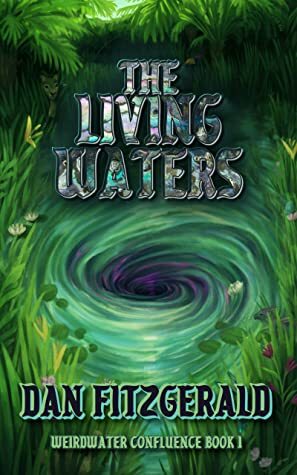 “I had something similar with the Maer Cycle–Hollow Road, while not a kids’ book, only has closed-door sex scenes, whereas The Archive [book two in the series – Bjørn] has quite a few, some fairly detailed. Lilly Ellison of Fiction Fans podcast referred to my “smutty sequels,” because both series have the same “problem.”
“I had something similar with the Maer Cycle–Hollow Road, while not a kids’ book, only has closed-door sex scenes, whereas The Archive [book two in the series – Bjørn] has quite a few, some fairly detailed. Lilly Ellison of Fiction Fans podcast referred to my “smutty sequels,” because both series have the same “problem.”
“I had many discussions with many women about how I was portraying Patia in The Isle of a Thousand Worlds, and about the fact that a female main character isn’t allowed to be certain ways–lusty, stubborn, focused on her own wants and needs, etc. She just comes off as unlikable. And that was, and is, a concern. Some female readers have said positive things about her portrayal, but perhaps there are others who didn’t like her and simply didn’t say so. I may never know. It was a big risk, and I can’t say that the payoff has been there for me, but I’m moving on to other projects, having learned a great deal.”
Knowing the answer, I asked anyway. What is people’s problem with Patia?
“ The biggest issue seems to have been that she was just too powerfully motivated by fulfilling her own needs, be they sexual or otherwise. But mostly I think it was the lustiness. So I toned it down, though I did hesitate, because male characters are maybe allowed to be a bit more lusty than female ones, and it bothers me. But I’m a cis het man, and when three women said some version of the same thing, I listened.”
Could the “older” bit be the problem? Aren’t ancient people above 40 supposed to just…decompose or something?
“While I’m not as old as them, I am over fifty, and I can say with confidence one’s sex life can age like wine if one is open to the possibilities,” Dan smiles. “I also think it’s really important to have older characters with rich romantic and sex lives. Quenby Olson does a fabulous job in that regard, and she’s an absolute icon in my eyes.
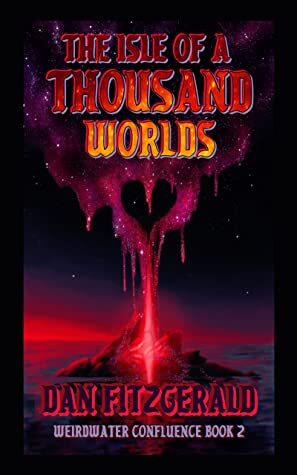 “I had a lovely beta reader, Susan Hancock, who loved the fact that Patia, an older woman, was lusty and went after what she wanted and didn’t let anything get in her way. She also helped calm my brain-weasels about writing multiple sex scenes from a female point of view–and let me tell you, I almost shelved the damn book over my anxiety on that topic.”
“I had a lovely beta reader, Susan Hancock, who loved the fact that Patia, an older woman, was lusty and went after what she wanted and didn’t let anything get in her way. She also helped calm my brain-weasels about writing multiple sex scenes from a female point of view–and let me tell you, I almost shelved the damn book over my anxiety on that topic.”
It was at this point that it dawned on me that perhaps straight people could be queer too. I didn’t want to pry into Dan’s personal life, though, since am a v. tactful person filled with restraint and known for impeccable manners.
“When I read M/M romances,” Dan continues, “there’s a whole different vibe, largely exempt from the traditional tropes of gender roles. F/F, NB, whatever, in the world of queer indie romance, from my limited experience, you get the pure love story without the patriarchal baggage. And where the baggage is present, it’s explicitly rejected. Give me an NB character pegging a bi man (looking at you, The Chief by J Calamy) over a traditional romance story any day.”
Briefly derailed by the memory of Olivia Wade’s All the Feels which made me google “pegging,” I think of how I actually prefer F/M romance to M/M. As a gay man, shouldn’t I prefer M/M? And Dan, as a… as an assumption… OUT YOURSELF FOR THE READERS, DAN!!!
“I’m pretty straight in my attractions. But when I read a book about a love story, or a sex scene, the genders or bodies of the characters matter less. I can find an M/M scene hot af, and it’s not really related to my own personal attractions. It’s the skill of the writer in conveying the emotion and the visceral feel of the scene. Or maybe I’m exploring in some way I’m not really aware of? Who can say? As far as I know, it’s nothing more than me wanting to feel all the feels, not just the ones I’m supposed to be feeling…”
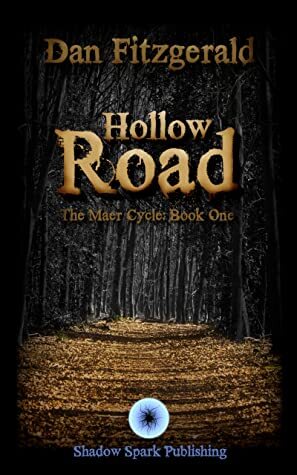 This reminds me of the time when I failed to join Amsterdam’s gay scene. It seemed to consist of topless, ripped guys, who briefly interrupted their orgies to do some drugs as house beats shook the walls. For a long time I struggled with the thought that “I’m not being gay right” because out of all those things I was only interested in drugs. I mean, music. It took me a long time to understand that the reason why homely, chubby nerds like me were not a part of the gay circuit scene was that we were chubbily nerding at home. If you don’t step on the stage, don’t expect an audience… or? Is it possible to be simultaneously mainstream and different?
This reminds me of the time when I failed to join Amsterdam’s gay scene. It seemed to consist of topless, ripped guys, who briefly interrupted their orgies to do some drugs as house beats shook the walls. For a long time I struggled with the thought that “I’m not being gay right” because out of all those things I was only interested in drugs. I mean, music. It took me a long time to understand that the reason why homely, chubby nerds like me were not a part of the gay circuit scene was that we were chubbily nerding at home. If you don’t step on the stage, don’t expect an audience… or? Is it possible to be simultaneously mainstream and different?
“I can’t exactly explain it,” Dan says, “but–and keep in mind, I’m reading almost entirely indies here–I feel like mainstream romance is targeted to a certain demographic that wants a certain product delivered in a certain way.
“I have been searching for romantic stories that aren’t traditional, that have heft and weight and all of that. I read books that sound interesting, and I have definitely made it a point to read M/M, F/F, M/F, and NB romance stories. I want to learn as much as I can about how romantic stories can be constructed, but honestly, I just like queer romance stories better.”
Hold on there, Buster. How did we end up here? Didn’t you say you write fantasy? Isn’t it bad enough that the only swords hide in the characters’ pants? (I have no regrets.) Many reviewers, when they encounter romance in a fantasy novel, either say the book would have been better without the consensual cuddles, or add “normally I don’t like romance in fantasy, but…” disclaimers. Anyway. What are you writing, Dan?
“My next books will be: The Delve (romantic dungeon fantasy), Wings so Soft (fantasy romance), and Cloti’s Song (romantic fantasy with enough sex scenes some might be tempted to call it erotica–and it might be fantasy romance/erotica; only time will tell),” Dan says helpfully.
Why is one romantic fantasy and the other fantasy romance, I ask. I don’t dare ask what “romantic dungeon fantasy” is.
“The difference is that in fantasy romance, the romance is the main plot, and if you take away the fantasy story, you still have a romance that holds together, but if you take away the romance, the fantasy story would feel thin. Conversely, in romantic fantasy, the fantasy plot is the main story, and the romance is an important element but you still have a fantasy plot if you remove it. The search for the Universal Tincture and for the Thousand Worlds is the main storyline of Isle, so it’s romantic fantasy.
“I am no expert, but it’s clearly a bit of a continuum, and all my next 3 books fall somewhere on that continuum, but each lands in a different spot. I can confidently say that Wings so Soft is a fantasy romance, because the love story is really the main event. The fantasy stuff is cool, but it’s background, and when I was writing it, I kept finding myself pushing it a little farther away from the story because I wanted the relationship to shine, which I really think it does. I have high hopes for this book.
“I’m learning as I go, and editing is a thing that happens, so we’ll see. But I’m all-out writing exactly what I want to read, and that is fantasy books with lots of feels and lots of sex.”
Buy Living Waters from AmazonBuy Isle of a Thousand Worlds from Amazon
DAN FITZGERALD•DAN FITZGERALD•DAN FITZGERALD•DAN FITZGERALD•DAN FITZGERALD•DAN FITZGERALD•DAN FITZGERALD•DAN FITZGERALD•
The post Bjørn Again – Erotica, Romance, and Sword-Free Fantasy with Dan Fitzgerald appeared first on BEFOREWEGOBLOG.
Review – The Utterly Uninteresting and Unadventurous Tales of Fred, the Vampire Accountant by Drew Hayes
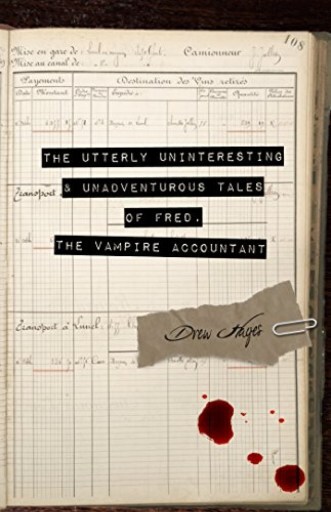 THE UTTERLY UNINTERESTING AND UNDADVENTUROUS TALES OF FRED THE VAMPIRE ACCOUNTANT is the overly long (but entertaining) title for a new urban fantasy series. I’ve read several of Drew Hayes other novels, mostly his Superpowered series, and enjoyed them greatly. As a fan of vampires fiction, I was extra invested in seeing what it was like. Horror and humor are two great tastes that taste great together when done well.
THE UTTERLY UNINTERESTING AND UNDADVENTUROUS TALES OF FRED THE VAMPIRE ACCOUNTANT is the overly long (but entertaining) title for a new urban fantasy series. I’ve read several of Drew Hayes other novels, mostly his Superpowered series, and enjoyed them greatly. As a fan of vampires fiction, I was extra invested in seeing what it was like. Horror and humor are two great tastes that taste great together when done well.
The premise is Fred Frankford Fletcher is a certified CPA who finds himself transformed into one of the undead. Not knowing his sire, Fred goes about his incredibly boring life until his high school reunion when he discovers that the number of supernatural creatures in the world far exceeds just vampires. The book is full of Fred’s adventures dealing with dragonkin, high as a kite mages, necromancer gamers, wereponies, and sexy government agents who have a vampire fetish.
Fred’s adventures are effectively a series of loosely connected short stories ranging from Fred going back to his high school reunion to finally confronting his absentee sire. They tend to be on the silly side with Fred forced to joust for the fate of a friend’s soul (despite no horse or melee experience) or getting caught up in a deranged LARP where everyone is going to be sacrificed for supernatural power but him.
Fred is a fantastic protagonist and while he’s a bit overly drawn as a boring milquetoast nerd, he works well as a point of view character for the weird wild world he’s found himself in. Polite and reserved are not qualities normally associated with urban fantasy heroes. He’s a good guy despite his blood-drinking status but not so good as to be unbelievable. He’s a nice contrast to characters like the Tome of Bill’s protagonist or my own Straight Outta Fangton’s lead.
I also love Fred supporting cast, particularly Krystal Jenkins who serves as Fred’s romantic partner. A fellow nerd from high school who has grown out of her awkward phase, she’s also ended up working for the United States’ sinister Agency. It is the organization that attempts to maintain the fragile peace between all the various supernaturals while keeping the US propped up against its enemies. I found her a likable character and also someone who is out of Fred’s league but still believable in returning his affections.
The book is half-parody, half-serious adventure and that’s really where the best humor in these sorts of books resides. As Mel Brooks once said, “the key to doing a great parody is when it works as a successful example of the work as well as a send-up.” That’s certainly the case here with Fred blundering his way through a complicated world of monsters, magic, and conspiracy while just trying to live a thoroughly mundane life.
It’s difficult to say which story I liked the most because I enjoyed all of Fred’s peculiar adventures. If I had to choose, I enjoyed him visiting his high school the most. Fred is trying to show up his old classmates but because he can’t reveal he’s a vampire, he utterly fails in the process. I think we all would react like Fred if we could as the urge to show off is innate human need. It’s also nice to hear what Krystal was doing before she became a super-spy.
In conclusion, this is a great book and I absolutely loved it. If you don’t necessarily like your monsters to be particularly scary and enjoy a bit of camp with your reading then this is a solid piece of fiction. Fred is a great character and I’ll definitely be picking up the other volumes in the series. It’s not a particularly serious novel but that’s not what it was going for.
Buy from Amazon
The Utterly Uninteresting and Unadventurous Tales of Fred, the Vampire Accountant•The Utterly Uninteresting and Unadventurous Tales of Fred, the Vampire Accountant•The Utterly Uninteresting and Unadventurous Tales of Fred, the Vampire Accountant•The Utterly Uninteresting and Unadventurous Tales of Fred, the Vampire Accountant•The Utterly Uninteresting and Unadventurous Tales of Fred, the Vampire Accountant•The Utterly Uninteresting and Unadventurous Tales of Fred, the Vampire Accountant•The Utterly Uninteresting and Unadventurous Tales of Fred, the Vampire Accountant•The Utterly Uninteresting and Unadventurous Tales of Fred, the Vampire Accountant•
The post Review – The Utterly Uninteresting and Unadventurous Tales of Fred, the Vampire Accountant by Drew Hayes appeared first on BEFOREWEGOBLOG.
July 19, 2022
Six Elementals Author Interview – A.J. Rettger

“A willingness to help people isn’t a curse, Mario. It’s a gift.”
Six Elementals Author Interviews will introduce prospective readers to some of the best writers in their genre you may, or may not, have heard of, via a series of six questions. I encourage you to check out the work of these phenomenal creatives! Links to their websites and purchase links will always appear, accompanying the interview. Check them out!
 I am honoured to be interviewing a fellow FriesenPress writer, the best-selling grimdark fantasy author A.J. Rettger! A.J.’s currently published works are: Oathbreaker, and Season of Kings.
I am honoured to be interviewing a fellow FriesenPress writer, the best-selling grimdark fantasy author A.J. Rettger! A.J.’s currently published works are: Oathbreaker, and Season of Kings.
P.L.: Such a privilege to be able to interview you, A.J.! Welcome to Six Elementals Interviews! Oathbreaker was a fantastic book, one thrilling scene after the next! Yet, you still managed to bring depth and breadth of worldbuilding to the novel, along with the heart-stopping action. What inspired the great worldbuilding of Oathbreaker, a world of werewolves, vampires, demons, dwarfs, elves, humans, shapeshifters, and so much more?
A.J.: Thank you so much for having me! It is an absolute pleasure. As for your question, a lot of the worldbuilding came from a combination of other author’s works and real world mythology and folklore. Anyone one who knows me knows that I am a big fan of Sapkowski’s Witcher Series, so the idea of having one massive continent with a handful of small islands and land masses came directly from his work. In terms of the monsters, I took as much as I could from not only European folklore but also other cultures that are often underrepresented in fantasy such as Japanese, African, South American, etc. Then once I had taken the monster or creature from folklore, I put my own spin on it, while trying to stay true to the legends that surround it.
P.L.: While your worldbuilding was great, you have become well-known for your blistering action scenes, that I and others have compared to famed author Joe Abercrombie, otherwise known as “Lord Grimdark”.
You kept me on the edge of my seat through most of the book, wondering how anyone would make it out alive! What, for you, are the elements that go into making your action scenes so spectacular?
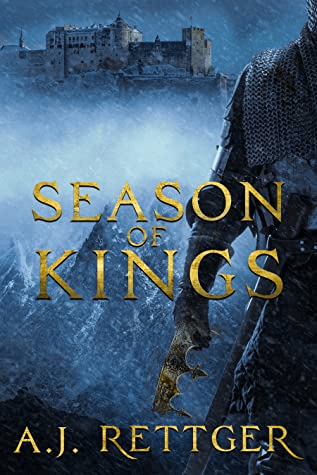 A.J.: I learned from my mentor that sentence structure is critical when crafting an action scene. It is one thing to write a sentence about someone swinging a sword, but in order for the reader to actually feel the intensity of the situation, you have to craft your sentence properly. How I was taught to do this was to keep my sentences short and sweet, so that the writing mimics the blistering pace of the scene.
A.J.: I learned from my mentor that sentence structure is critical when crafting an action scene. It is one thing to write a sentence about someone swinging a sword, but in order for the reader to actually feel the intensity of the situation, you have to craft your sentence properly. How I was taught to do this was to keep my sentences short and sweet, so that the writing mimics the blistering pace of the scene.
P.L.: You’ve said you love to listen to heavy metal music, and that it inspires your writing? What are your favourite bands? I understand the reader can find references to some of those bands in Oathbreaker! That’s fascinating! Can you tell us about that please?
A.J.: I love heavy metal. Some of my influences are Avenged Sevenfold, Slipknot, Fit for an Autopsy, Trivium, King 810, and so much more! There are so many references to these bands and artists in my book that I can’t list them all. But some of the more prominent ones, is on the map (if you have the physical copy of Oathbreaker) there is a body called the Sea of Tragic Beasts, which is the title of my favourite Fit for an Autopsy album. I even posted it on Instagram and got support from the band, so that was a very cool fanboy experience for me.
P.L.: You deal with the issue of racism in Oathbreaker, where different races, among them elves, dwarves, werewolves, humans, have issues of systemic mistrust and dislike that is woven into the fabric of their societies. It takes a lot of courage to broach such a topic and you handle it with appropriate care and sensitivity. What made you decide to tackle this issue in Oathbreaker?
A.J.: I always strive to reflect the real world in my work, and unfortunately, systemic racism is still a prominent issue that plagues our world today. Even though my work is on the darker side of fantasy, I try to show how people coming together and putting their differences aside to achieve a goal that would leave the world a better place. I do this hoping my readers will behave the same way. I truly believe that unity and togetherness is the answer to most of life’s problems.
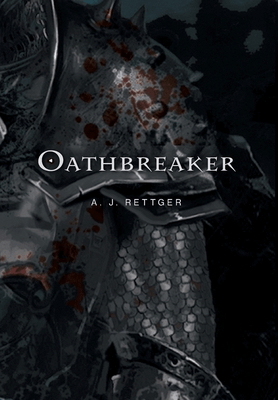 P.L.: It also takes guts to end a book on a cliffhanger! I loved your ending in Oathbreaker, but now (curse you) I am chomping at the bit with anticipation for the next book! What made you decide to end the book at the juncture that you did?
P.L.: It also takes guts to end a book on a cliffhanger! I loved your ending in Oathbreaker, but now (curse you) I am chomping at the bit with anticipation for the next book! What made you decide to end the book at the juncture that you did?
A.J.: I love cliffhangers because they always build anticipation for what’s next. There is another book of adventures Mario and the gang coming soon and I wanted to end it on a cliffhanger purely to build hype for book two.
P.L.: What are some of the authors that have inspired you? Who are some of your favourite authors?
A.J.: Definitely Sapkowski! He is my literary hero. Other traditionally published authors that have influenced me are Anthony Ryan, David Dalglish, and Tolkien. Since I’ve published my first book, some fellow self-published authors that have inspired me are H.L. Tinsley, Sean Crow, Zamil Akhtar, and Zack Argyle.
P.L. Thank you so much A.J. for being willing to be interviewed by me! It was great speaking with you!
Contact A.J. on Twitter: @arettger22
Original Interview appeared here
Check Out Other Six Elemental Interviews
Six Elementals Author Interview – CLAYTON SNYDER
Buy Oathbreaker from AmazonBuy Seasons of Kings from Amazon
A.J. RETTGER•A.J. RETTGER•A.J. RETTGER•A.J. RETTGER•A.J. RETTGER•A.J. RETTGER•A.J. RETTGER•A.J. RETTGER•
The post Six Elementals Author Interview – A.J. Rettger appeared first on BEFOREWEGOBLOG.
July 18, 2022
The Anarchism of the Dresden Files by CT Phipps
The Dresden Files justifiably gets a lot of criticism over the years (reasons vary according to individual readers). I, on the other hand, love the books, and they remain one of my all-time favorite series. Their action, humor, and world-building are things I’ve only found a few series like and it has been a major influence on my own writing.
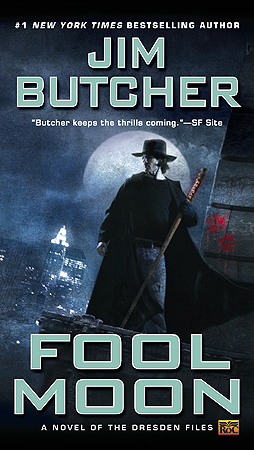 However, one area I’ll always give the books credit is their handling of anarchist sentiment. What? You don’t think it’s an anarchist series? Allow me to disagree. The books are incredibly anti-authority, hierarchy, and systems of control. This essay will prove this by showing his relationship to the White Council, police, and how Harry uses anarchist methods to undermine both in the name of justice. It will, necessarily, also contain spoilers up to the most recent book, Battle Ground, as well.
However, one area I’ll always give the books credit is their handling of anarchist sentiment. What? You don’t think it’s an anarchist series? Allow me to disagree. The books are incredibly anti-authority, hierarchy, and systems of control. This essay will prove this by showing his relationship to the White Council, police, and how Harry uses anarchist methods to undermine both in the name of justice. It will, necessarily, also contain spoilers up to the most recent book, Battle Ground, as well.
I hope you enjoy!
WHAT IS ANARCHISM?For the purposes of this essay, we’ll be going with the dictionary definition of anarchism: belief in the abolition of all government and the organization of society on a voluntary, cooperative basis without recourse to force or compulsion. This isn’t to say that Harry isn’t going to believe in certain undying principles, very much the opposite, but these have to be compelled through willingness to follow the rules out of a desire to do so rather than through fear of force.
It will come up repeatedly that the fear of punishment is something that flat out doesn’t scare Harry and it is an attitude he encourages in his apprentices. Instead, Harry teaches his reasons for following principles like the Laws of Magic on the basis of them being good ideas. It also sets the stage for his everlasting hostility to authority and those who attempt to govern through the threat of force like the White Council and police.
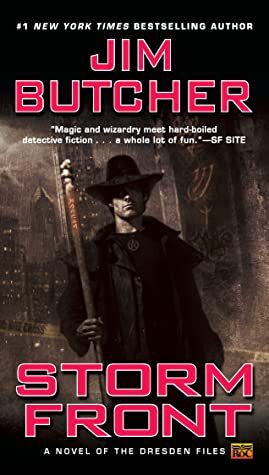 HARRY AND THE WHITE COUNCIL
HARRY AND THE WHITE COUNCILThe books are noir pastiches and while they moved toward high fantasy, they’ve never entirely shed their detective novel roots nor have they lost the unremitting hostility they have toward hierarchy. Our protagonist, Harry Dresden, begins the book as that classic staple of Les Miserable “the innocent man hunted by a rabid cop.”
In this case, Harry killed a dirty cop (his mentor, Justin, was a Warden despite being a warlock) in self-defense and has been harassed and pushed toward violence by Morgan for decades thereafter. Morgan won’t just gun Harry down but wants to agitate him into giving him plausible deniability.
Interestingly, enough, Harry believes passionately in the Laws of Magic and continually makes excuses for the White Council as well as their harsh methods even as he’s a subject of their persecution. They even are willing to wage war on the Red Court when he starts a war on them, which buys them a lot of points with Harry.
However, from the very beginning, the White Council’s support of Harry is tepid at best and there are questions of turning him over to the Red Court for peace and Harry never improves in his opinion of their handling of the Laws of Magic’s enforcement. We also slowly find out that Harry gets as much slack as he does due to nepotism. Literally, the only reason he wasn’t executed was the Blackstaff was his grandfather and chose to adopt him after Justin’s death.
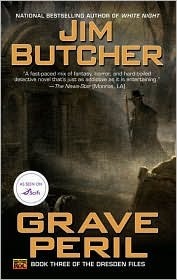 The corruption and arrogance of the White Council goes beyond the “few bad apples” Harry initially suspects the Black Council to be but soon become clear to be entirely the ethos of the organization and how it relates to the rest of the world. They are heavy-handed, ruthless, and dismissive of any talents not powerful enough to be full wizards to the point of doing nothing to protect them against persecution by groups like the White Court. Harry, himself, is also the only wizard to actively defend the public against supernatural threats since most of them are covered by the Unseelie Accords.
The corruption and arrogance of the White Council goes beyond the “few bad apples” Harry initially suspects the Black Council to be but soon become clear to be entirely the ethos of the organization and how it relates to the rest of the world. They are heavy-handed, ruthless, and dismissive of any talents not powerful enough to be full wizards to the point of doing nothing to protect them against persecution by groups like the White Court. Harry, himself, is also the only wizard to actively defend the public against supernatural threats since most of them are covered by the Unseelie Accords.
At one point, Harry himself, becomes a Warden and the lover of their leader. This should have been a great moment for establishing the White Council’s perspective as well as how Harry has been misjudged. Instead, it just further exposes Harry to the dark side of “his” supporters and after successfully stopping a Black Council agent that had been mind-controlling them all for years, they blame Morgan as well as elect another corrupt agent to their highest ranks.
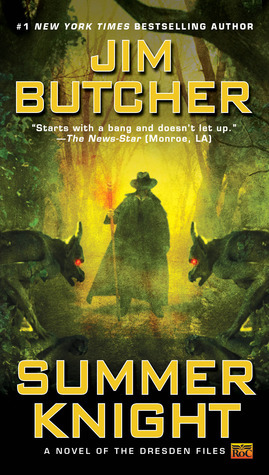 It’s no wonder that by the time Harry returns from his “coma” that he’s lost all cachet with the younger Wardens, who have become radicalized true believers in the White Council’s “us against them” mentality and every bit as eager to believe in Harry’s guilt as Morgan. Truly, a sense of how Jim views authority can be shown with the kangaroo trial of Molly Carpenter where they come within inches of killing a holy knight of God’s daughter even if it would destroy dozens of lives as well as alliances.
It’s no wonder that by the time Harry returns from his “coma” that he’s lost all cachet with the younger Wardens, who have become radicalized true believers in the White Council’s “us against them” mentality and every bit as eager to believe in Harry’s guilt as Morgan. Truly, a sense of how Jim views authority can be shown with the kangaroo trial of Molly Carpenter where they come within inches of killing a holy knight of God’s daughter even if it would destroy dozens of lives as well as alliances.
Harry works with the police, which would normally disqualify him as an anarchist hero, but Butcher nicely lays the seeds for just how fragile and one-way his relationship with the Chicago PD really is. While they’re willing to hire him as a consultant, he is a figure of derision and mockery even as he continually aids them against horrifying threats. No matter how many innocent lives Harry saves, the police view him as a necessary evil at best.
Many longtime fans of the series believe I’m exaggerating because Harry’s most permanent ally in the book is Lieutenant Karrin Murphy, who would right at home in a Law and Order spin-off. Surely as an honest cop, Karrin is a rebuttal that the Dresden Files are anti-authority. Indeed, it is the lengthy arc of said character that mirrors Dresden’s own in reverse and helps show exactly where the series stands on its politics.
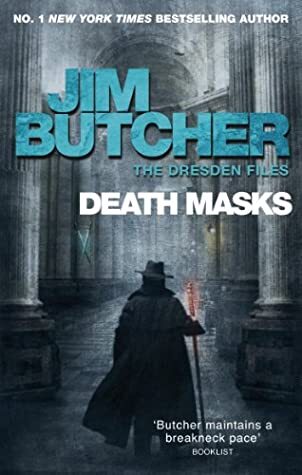 For me, the groundwork was laid in Fool Moon rather than Storm Front. While Storm Front established Harry was a rogue hated by the White Council’s chief enforcer, Fool Moon shows just how easy it is to get the police to turn on Harry. Indeed, Karrin herself shows that allying with the police necessitates turning on Harry and she even blames him for not informing her of the supernatural goings on. As we later discover, telling the police about the supernatural doesn’t help matters and most of them are either in the pocket of Marcone, the Formor Court, the Red Court, the White Court, or some combination thereof.
For me, the groundwork was laid in Fool Moon rather than Storm Front. While Storm Front established Harry was a rogue hated by the White Council’s chief enforcer, Fool Moon shows just how easy it is to get the police to turn on Harry. Indeed, Karrin herself shows that allying with the police necessitates turning on Harry and she even blames him for not informing her of the supernatural goings on. As we later discover, telling the police about the supernatural doesn’t help matters and most of them are either in the pocket of Marcone, the Formor Court, the Red Court, the White Court, or some combination thereof.
It’s not too much of a spoiler to say Murphy’s character arc is to have her attempt to follow the spirit of the law and protect the public, only to be slowly edged out of the police before being expelled entirely. By contrast, the originally seemingly decent cop, Rudolph, increases his wealth as well as influence within the CPD the more he becomes a contemptible corrupt weasel.
Butcher’s depiction of the Chicago PD is actually fairly vicious and contrasts heavily with the romanticized view presented by television or other media. Marvel comics was incredibly hesitant to have Frank Castle, AKA The Punisher, ever kill a cop (even a dirty one). The first one he did was actually a SHIELD agent to avoid the controversy. However, Jim Butcher has Molly Carpenter openly confessing to doing so in Ghost Story as she explains that the Chicago PD was turning a blind eye to the trafficking in children by the Formor.
Perhaps the most blatant example of how contemptible the police in the Dresden Files is when Rudolph accidentally kills Murphy in what is the most controversial moment of the series. He isn’t even attempting to do it but it happens because of poor trigger discipline, cowardice, and incompetence. His misplaced sense of priorities in a crisis paint what is arguably the most realistic example of police malfeasance I’ve seen in urban fantasy yet.
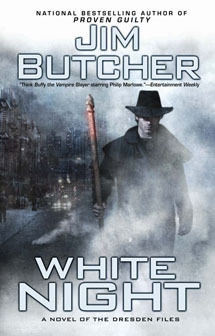 The Dresden Files rarely gets into specifics regarding issues of profiling, minority abuse, and police brutality but the depiction of the police is largely one of a useless organization when not actively abetting the forces preying on the public. They have their moments, especially when the Formor turn on their allies and openly attack the city, but there’s no indication the organization will change for the better. Especially as Rudolph planned to go after Harry and Murphy just hours before.
The Dresden Files rarely gets into specifics regarding issues of profiling, minority abuse, and police brutality but the depiction of the police is largely one of a useless organization when not actively abetting the forces preying on the public. They have their moments, especially when the Formor turn on their allies and openly attack the city, but there’s no indication the organization will change for the better. Especially as Rudolph planned to go after Harry and Murphy just hours before.
All of this could just show the world is a crapsack one and that Harry isn’t an anarchist, but I actually think Jim shows our protagonist using said philosophy’s methods to undermine the traditional authority of his world.
As early as Fool Moon with Kim Delaney and later reinforced with the death of Kirby in Turncoat, Harry realizes that keeping himself above his less powerful allies is a recipe for disaster. This actually lays the groundwork for Harry, not as a lone wolf soldier, but as the unlikely agitator and organizer of a large scale anarchist resistance.
Harry’s aid is important in helping lay the groundwork for the Paranet that protects practitioners against the supernatural forces that used to prey on them with impunity. He and Karrin recruit the Alphas, Order of the Large Cooking Pot, and others to start becoming a power block outside of traditional structures. Their alliances with individuals like Odin and Marcone are uneasy ones but show how grassroots organizations can become entangled with questionable forces in the name of larger goals.
Harry attempts to reform from within as well by helping create the Gray Council and working as a Warden among younger forces, but these things are ultimately unsuccessful. The Blackstaff, his own grandfather, proves willing to murder him due to his hatred of Thomas Raith. Ramirez, his closest ally among the Wardens, turns on him as we’ve mentioned before. To quote Audre Lord, “The master’s tools will never dismantle the master’s house.”
Ironically, it is Harry’s relationship forged with the Demifae that provides one of his largest advantages. Even Harry doesn’t seem to realize that by simply acting with kindness and letting them organize under his protection, he had created a vast alliance of a overlooked minority. This proves decisive in the Battle of Chicago when the White Council and Unseelie Accords prove useless along with the US military.
Harry is a champion of the people, and his army is the people against the Man.
Buy Storm Front (Book 1 of the Dresden Files) by Jim Butcher
DRESDEN FILES•DRESDEN FILES•DRESDEN FILES•DRESDEN FILES•DRESDEN FILES•DRESDEN FILES•DRESDEN FILES•DRESDEN FILES•
The post The Anarchism of the Dresden Files by CT Phipps appeared first on BEFOREWEGOBLOG.
Review – REIGN & RUIN by J.D. Evans
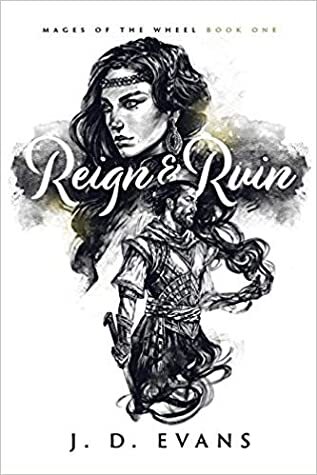 After a long succession of reading quite incredible yet quite dark and more nihilistic fantasy books, some palate-cleansers were probably a good idea. Nothing can reset my reading orientation quite like good fantasy-romance, and why not pick up an award-winning one for good measure?
After a long succession of reading quite incredible yet quite dark and more nihilistic fantasy books, some palate-cleansers were probably a good idea. Nothing can reset my reading orientation quite like good fantasy-romance, and why not pick up an award-winning one for good measure?
Thus, for my first read of #SPFBOwinners July 2022 reads, where some of my TBR includes champions of Mark Lawrence’s Self-Published Fantasy Blog-Off (SPFBO), I selected the most recent winner of the coveted selfie-stick (the physical prize for winning SPBFO), at SPFBO Number 7, “Reign and Ruin” (Book One of Mages of the Wheel) by J.D. Evans.
Obviously, with this book being an SPFBO champion, expectations were high. No worries here: the book was wonderful.
The plot of “Reign and Ruin” revolves around the relationship between two fascinating and dynamic characters: Naime and Makram. Both are high-ranking royals and powerful mages, from different realms.
Naime is the heir by right to Tamar’s throne. However many of Tamar’s sexist nobles on the royal Council are not enthused about the prospect of a female ruler. As Naime’s father, the ruling Sultan, ails in the grips of dementia, the Sultan’s deteriorating health will force the succession issue, but Kadir, the influential Grand Vizier – a rival of Naime’s but a childhood friend of her father – and his supporters plans are to marry Naime off in a politically advantageous match.
The man Naime marries will be the ruler, not Naime, with the Grand Vizier as the real power behind the throne of Tamar. But Naime, while young, is very politically astute, judicious, confident, and born to lead and rule. What she lacks in experience in terms of diplomacy and court intrigue, she makes up in intelligence, determination, and gumption.
Makram is the Agassi, second-in-line to the throne of Sakrum. Kinus, the current sovereign, and Makram’s older brother, is suspicious, paranoid, and somewhat unpopular. There is a concerted faction of Sakrum’s elite who would like to supplant Makram in his brother’s place, but the loyal Makram will have none of it. He is unfailingly steadfast, and while very clever himself, his exposure is that he cannot envision his brother turning against him.
Not only is Makram an elite warrior, and commander of his brother’s armies, but he is also one of the world’s most powerful mages. He sees himself as the protector of his people, and this humble, unpretentious yet somewhat enigmatic leader is someone who inspires devotion from those who follow him.
With Tamar imperilled by an enemy’s imminent incursion to their borders, Naime sees a potential alliance for Tamar with Sakrum, which has a powerful military (this is also her father’s vision). The Grand Vizier and Council are largely opposed to such an alliance, for numerous reasons, including mistrust of foreigners. With her father’s erratic behaviour and failing memory, Naime takes the reins and decisively steers her nation towards broaching relations between the two realms.
While the Lord of Sakrum rejects the alliance as well, Makram sees this as a mistake, and ends up reluctantly going behind his brother’s back, and taking a few trusted subordinates including his right-hand man Tareck, and journeys secretly to Tamar, in hope of preserving the alliance. Representing Sakrum, he therefore deals directly with Naime, who represents her people in turn. An attraction begins to smoulder, but their opposing magic, court politicking, and the complexities of both their positions, any romance is likely doomed.
The characterization alone in this book made it worthy of a five-star read, since both the two primary love interests and the secondary characters were outstanding. In terms of the two main ones, Naime is a force to be reckoned with. The combination of exterior beauty and inner beauty, wit, intellect, fortitude, compassion, and passion dazzles and captivates Markham, and puts her opponents scrambling, on the defensive. She is still untutored in the ways of romance, and ultimately still green as well to a certain degree in the court intrigue department, but she’s a natural.
Naime adeptly handles the cunning and malicious Vizier and his cronies, copes bravely and lovingly with her father’s dementia, and courageously refuses to allow any naivety, her gender, or her society’s expectations of what a woman’s role should be stand in her way of what’s best for her realm. She is not going to cede power to anyone just because she’s female, and she is going to be the Sultana that Tamar needs, no matter what anyone thinks to the contrary.
Handsome, quietly heroic, and intense, Makram seems a bit more brooding and introspective at first, yet also daring and charismatic. He has some insecurities about the way he was raised, and being the spare heir (whom so many want to overthrow the rightful one) has not been an easy role for him. His blindness and obstinacy towards his brother’s major flaws as a ruler is in turn Makram’s main flaw. But his respect for women, his unwavering support of and faith in Naime, his sense of honour and duty, and his general decency will win the reader’s heart.
Makram knows Naime does not need saving. So he does not attempt to save her. He is not looking for her to be a subservient queen to him, should they wind up together. While he wants partnership, he is also quite willing, even encouraging, for her to be the nominal leader, with him in a supporting role. This progressive and open-minded approach, and his integrity, helps make him an extremely likeable character.
The supplementary players are phenomenal, and its apparent that Evans has set readers up for them to figure more prominently in future series. The banter and brotherhood between Makram and Tareck is humourous and heartwarming, and faithful Samira as Naime’s best friend and adviser is a standout.
The worldbuilding in this book was marvellous. It appears to be sculpted largely from ancient Middle Eastern customs and history, particularly the Ottoman Empire, and is luxuriant and realistic. The various nations have their own unique traditions and idiosyncrasies. The magic system is intriguing, with different types of mages, many of them tied to the elements – i.e. fire mages, water mages, earth mages, wielding in some cases enormous powers.
Despite looking for lighter fare with my current reads, I need compelling themes in a novel to make it truly engaging for me, and this book had them. Dealing with a parent with dementia, PTSD from battle, misogyny, gender issues, emotional vulnerability, trust, bigotry, and more are threaded through the narrative, and are all topics that are sensitively and well-handled by Evans. Balance is also a main theme in the book. Part of what Naime strives for is to right “The Wheel”, and help bring order to the state of magic.
The prose is gorgeous, and the Reign and Ruin is exquisitely written. This is the sort of engaging, lyrical, yet efficient prose one might expect from such a lauded book.
Now for the good stuff: the romance! Reign and Ruin has got that right amount of steam, slow-burn, building up from initial wariness and even irritation with one another (but still the beginnings of attraction) to something very intense. The writing of especially the foreplay scenes, will not only get your heart racing but also enchant you with the sheer beauty of Evan’s words. The author really knows how to use language to set the mood and combine the melding of the lover’s magic with the melding of their hearts.
“His magic answered hers with shadow for her light. Smoke beneath his skin, shadowed flames twining through and around the sharp, bright light of her power. They were a swirling, ever-changing harmony, his peace for her tempest, his restlessness for her calm, his recklessness for her planning, her independence for his loyalty. Night and day, dusk and dawn, the end, and the beginning.”
“Reign and Ruin” won an SPFBO Championship in the face of some incredibly stiff competition, and now having read it, I can see why many bloggers found it to be a deserving victor. It was an excellent book, and I am all in for continuing with the future installements in Evans’ “Mages of the Wheel” series to see what happens next with the kingdoms of Tamar and Sakrum.
Check Out Some of Our Other Reviews#SPFBO8 Review and Cut The Trials Of Ashmount by John Palladino
#SPFBO8 Review and Cut – The Inquisitor by H.C. Harrington
Buy from Amazon
REIGN & RUINREIGN & RUINREIGN & RUINREIGN & RUINREIGN & RUINREIGN & RUINREIGN & RUINREIGN & RUIN
The post Review – REIGN & RUIN by J.D. Evans appeared first on BEFOREWEGOBLOG.
Game Review – Control
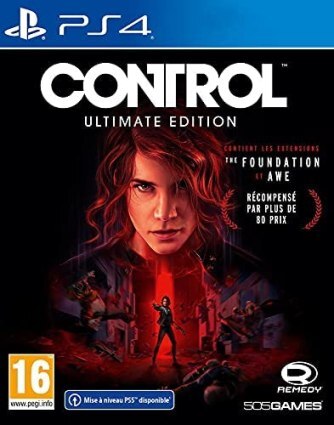 These were words spoken in reverse in the theme song of AMERICAN NIGHTMARE, the semi-official sequel to ALAN WAKE. It was meant to set up Alan Wake 2, which would take place in a town called Ordinary. Unfortunately, the disappointing sales of Alan Wake combined with other matters prevented us from ever discovering what was going to happen in Ordinary–until now.
These were words spoken in reverse in the theme song of AMERICAN NIGHTMARE, the semi-official sequel to ALAN WAKE. It was meant to set up Alan Wake 2, which would take place in a town called Ordinary. Unfortunately, the disappointing sales of Alan Wake combined with other matters prevented us from ever discovering what was going to happen in Ordinary–until now.
CONTROL is a stealth sequel to Alan Wake where you take the role of Jesse Faden, a young woman who has tracked down the mysterious Federal Bureau of Control that kidnapped her brother a decade earlier. Discovering no one at the front doors or, indeed, anywhere, she proceeds to investigate and ends up discovering the dead body of its director. Jesse picks up a mysterious gun by the corpse and unwittingly inherits leadership of the FBC. She also discovers the headquarters, called the Oldest House, is eldritch location that would give R’lyeh a run for its money.
Unfortunately, the FBC is having the worst day in its seventy-year-history with an extradimensional noise called the Hiss possessing large numbers of the staff before turning them into aggressive zombie-like monsters that can still use guns. A handful of the employees are still alive and all of them instinctively recognize Jesse as their new leader. Jesse is both annoyed and intrigued by this since she planned to bust out her brother from these people, not save them from a parasitic noise.
Jesse finds herself running from place to place, doing errands for her employees that are justified by the fact they’re mostly terrified researchers and she not only has a magic gun but soon develops powerful telekinetic abilities by draining the artifacts the Bureau of Control keeps on lockdown. Some of them are unhelpful to her quest to free her brother while others are genuinely shocked at the idea they’ve been keeping someone prisoner for seventeen years.
 The purpose of the game is to eventually unlock all of the secret doors and passageways through the Oldest House as well as solve the mystery of the Hiss before shutting them out of this dimension. You also find out what happened to Dylan Faden right before it gets ridiculous that Jesse keeps putting it off. I have some complaints about the ending (see below) but it is, overall, a truly fantastic game.
The purpose of the game is to eventually unlock all of the secret doors and passageways through the Oldest House as well as solve the mystery of the Hiss before shutting them out of this dimension. You also find out what happened to Dylan Faden right before it gets ridiculous that Jesse keeps putting it off. I have some complaints about the ending (see below) but it is, overall, a truly fantastic game.
Gameplay-wise it’s a third person shooter with psychic abilities. Jesse fights hundreds of Hiss throughout the corridors of the Oldest House. You can shoot them, throw rocks at them, levitate to do either, or dash past them. It’s a surprisingly entertaining gameplay loop and serviceable enough that I barely noticed the enemy variety is pretty weak. There are some great bosses in the game like the Pacman-like Anchor, essJ, and FORMER but these really should have been part of the main story rather than sidequests. I also note the game lacks a final boss, when they had a perfectly good one already programmed with essJ or someone programmed with her powers.
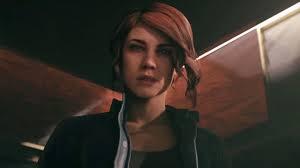 The game possesses a surprisingly versatile customization system with the option of basically activating cheat codes alongside the power to customize the difficulty along a slider. Jesse can become all but bullet-proof, unlimited energy, invincible, or one-shot kills with no judgement. It almost makes up for the absence of a New Game+ mode that I would have really appreciated given my maximized levels of powers that I had nothing to use on at the end.
The game possesses a surprisingly versatile customization system with the option of basically activating cheat codes alongside the power to customize the difficulty along a slider. Jesse can become all but bullet-proof, unlimited energy, invincible, or one-shot kills with no judgement. It almost makes up for the absence of a New Game+ mode that I would have really appreciated given my maximized levels of powers that I had nothing to use on at the end.
The Oldest House is an excellent example of “less is more” in terms of its graphics. The Oldest House looks like an old-style Seventies or Eighties government building with pneumatic tubes, carpeting, and green screen computers. Then things go “off” like the piping that leads to a massive nuclear power plant, sewer filled with humungous sentient clogs, and alien rock quarries in the basement that lead to alien vistas. Jesse Faden is a beautiful protagonist and while she’s a bit emotionally closed off, Courtney Hope does a fantastic job with her acting.
 Control is basically adaptation of the SCP Foundation. Those unfamiliar with that is it is an online project where people write stories about weird and inexplicable objects that are investigated by an X-Files like organization that contains them to protect the public. Control barely hides its influences with many of the materials you can pick up being similar to the reports you can see on the wiki like a rubber duck that follows you or a fridge that will kill you if you look away. It also combines elements of Twin Peaks and Remedy‘s other games, which I heartily approve of.
Control is basically adaptation of the SCP Foundation. Those unfamiliar with that is it is an online project where people write stories about weird and inexplicable objects that are investigated by an X-Files like organization that contains them to protect the public. Control barely hides its influences with many of the materials you can pick up being similar to the reports you can see on the wiki like a rubber duck that follows you or a fridge that will kill you if you look away. It also combines elements of Twin Peaks and Remedy‘s other games, which I heartily approve of.
Control’s nods to Alan Wake and it’s continuity also get an informal sequel in one of its two DLC that I recommend playing as essential parts of the game. We find out what Alan has been up to since the events of American Nightmare and how he possibly ties in to all the events of Control. You don’t have to play Alan Wake to enjoy the game but it’s an awesome game so I recommend you pick up Alan Wake Remastered after you finish it if you haven’t.
Buy from Amazon
control•control•control•control•control•control•control•control•
The post Game Review – Control appeared first on BEFOREWEGOBLOG.
July 16, 2022
Six Elementals Author Interview – CLAYTON SNYDER

“In the last room before we came to another open hallway, there was a goose. Bones littered the floor of the goose room. Even the golem gave it a wide berth as it softly honked in warning at us. “What’s with the goose?” Cord asked. The golem shrugged. “He was already here. No one wants to fuck with him.”
Six Elementals Author Interviews will introduce prospective readers to some of the best writers in their genre you may, or may not, have heard of, via a series of six questions. I encourage you to check out the work of these phenomenal creatives! Links to their websites and purchase links will always appear, accompanying the interview. Check them out!
 Grimdark fans, you won’t want to miss this one! Today I have the distinct honour of speaking to one of the top Grimdark authors on the fantasy scene today, the many-times decorated writer, Clayton Snyder!
Grimdark fans, you won’t want to miss this one! Today I have the distinct honour of speaking to one of the top Grimdark authors on the fantasy scene today, the many-times decorated writer, Clayton Snyder!
Clayton’s numerous currently published works include: River of Thieves; Child of Nod; Demons Ink; The Obsidian Palm; Thieves’ War; Queen of Nod; The Infernal Machine; Cold West; The Lot; The Forest; Remnants; Red in Thought and Deed; Goddess of Nod; Dark Ends and Grifty Shades of Fey: Cautionary Tales Uncovering the Dark Side of the Fair Folk (his stories featured in these anthologies with other authors).
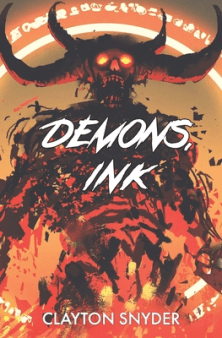 P.L.: Such a privilege to be able to interview you, Clayton! Welcome to Six Elementals Interviews!
P.L.: Such a privilege to be able to interview you, Clayton! Welcome to Six Elementals Interviews!
You are one of the more lauded authors in your sub-genre. You are a three-time Self-Published Fantasy Blog Off (SPFBO) Semifinalist. You are an SPFBO 7 Finalist for the 2021-2022 contest. You are a Washington Science Fiction Association (WSFA) & 2-time Reddit Stabby Award Nominee, a Booknest Longlist mention, and a Grimmy Award Winner. When you first started writing, could you envision how many accolades you have accumulated today, how many awards and nominations you would have received for your work? How does all the hardware make you feel?
Clayton: I never really expected to win anything, and if the nominations are any indication, I still haven’t. Still, it’s a little surreal. I don’t set out for nominations or awards, just to tell a story. Maybe a little differently than you’ve seen it before, maybe a little darker, but that’s about it. The accolades just seem to be happy accidents.
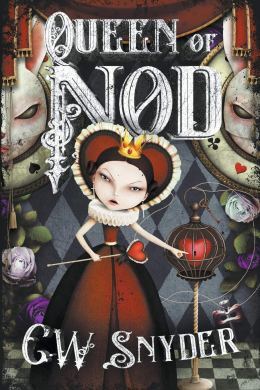 P.L.: The first story I read from you was Savages, which I understand later became the foundation for your SPFBO7 semi-finalist entry Demons Ink. It felt like a mash up between dark fantasy and a crime noir classic, and is extremely well-done. It’s dark, but of course, predominantly that’s what you write, grimdark. What inspires you to write dark fantasy, as opposed to any other sort of sub-genre, or genre?
P.L.: The first story I read from you was Savages, which I understand later became the foundation for your SPFBO7 semi-finalist entry Demons Ink. It felt like a mash up between dark fantasy and a crime noir classic, and is extremely well-done. It’s dark, but of course, predominantly that’s what you write, grimdark. What inspires you to write dark fantasy, as opposed to any other sort of sub-genre, or genre?
Clayton: I wanted to write about the stuff not everyone talks about. There are plenty of stories where the end is a foregone conclusion- the protag gets the guy/girl, the great evil is defeated, and everyone goes back to their chummy little lives under the monarchy. I wanted to talk about the stuff in the corners, the stuff we sweep under the rug: trauma, the lies we tell ourselves, the fact that not every hero is a perfect schmo with chiseled abs, a cleft chin, and great hair. Primarily because life is messy. I get the need for escapism, but I also think there’s a need to stare the ugly stuff in the eye and get to know it.
P.L.: What do you think are the ingredients to make a great book? What does Clayton Snyder consider when crafting your own books, many of which have gone on to be considered for awards?
Clayton: I don’t know that I consider anything other than the story. If there’s a theme there, it’s something I try to pull out in later drafts. As for a great book? Interesting prose, meaningful themes, banter, and a story that leaves me changed from when I picked that story up.
P.L.: Of all your many works, which is your favorite, and why?
Clayton: Probably Demons Ink because it’s the first time I completed a whole narrative without sidetracking/doing something weird. Conversely, The Obsidian Psalm because all those things I just mentioned got dumped by the wayside so I could do the oddest thing possible.
CLAYTON SNYDER•CLAYTON SNYDER•CLAYTON SNYDER•CLAYTON SNYDER•CLAYTON SNYDER•CLAYTON SNYDER•CLAYTON SNYDER•CLAYTON SNYDER•
 P.L.: Who are some of your favourite authors? What are you currently reading? Any book recommendations?
P.L.: Who are some of your favourite authors? What are you currently reading? Any book recommendations?
Clayton: Favorite authors: Anna Smith Spark, Michael R Fletcher, Krystle Matar, Michael McClung, Mike Shel—we could be here all day at this rate. I’m currently reading Charlie Stross’ The Laundry Files, which is kind of an urban fantasy by way of a sysadmin sucked into the world of Lovecraft. Recommendations? Anyone I mentioned above.
P.L.: You are considered by many to be a star in the self-publishing world. The self-publishing landscape is also changing, and it is becoming a more reputable and more lucrative means for many authors to get their work to their readers. Yet traditional publishing remains for many the preferred way to be an author. Regardless of all your success being self-published, and the industry changing whereby self-publishing is more viable than ever before, would you ever consider being traditionally published?
Clayton: I’m a star? My mom would be so proud. Uh, what was the question? Oh. Yes, I’m a fan of both avenues, and this year I’m querying via a couple of traditional publishing avenues.
P.L.: Clayton, it has been an honour to speak to you for Six Elementals Interviews! Thank you so much!
Thank you, Paul! I really appreciate you taking the time to do this!
Twitter: @ClaytonSnyder2
Amazon Page: https://www.amazon.com/C-W-Snyder/e/B08VN9QLTW/ref=dp_byline_cont_pop_book_1
Website: https://claytonwsnyder.com/
Buy Obsidian Palm from AmazonBuy The Infernal Machine from AmazonBuy Cold West from AmazonBuy Demons Ink from AmazonBuy Goddess of Nod from AmazonBuy Queen of Nod from AmazonBuy Child of Nod from AmazonBuy Norylska Groans from AmazonBuy Thieves War from AmazonBuy River of Thieves from Amazon
The post Six Elementals Author Interview – CLAYTON SNYDER appeared first on BEFOREWEGOBLOG.
July 15, 2022
Review – THE DARKNESS THAT COMES BEFORE by R. Scott Bakker
“The Darkness That Comes Before” (Book One in the “Prince of Nothing” Trilogy) R. Scott Bakker’s debut novel, is one that has become quite well known and revered in dark and epic fantasy circles. I must say, after hearing a bit about the book, and the series it was part of, it gained traction on my radar, because of the amount of recommendations from friends who raved about Bakker’s writing.
The author had a reputation for writing stark, dense, and at times confusing books, that warrant patience, but that are worth the struggle. Well, after beginning to tackle “Malazan Tales of the Fallen” recently, I figured, it can’t be any more difficult than that.
Or can it?
Well, while it was not (for me anyway) as daunting as “Malazan”, there were certainly some similarities. Yet ultimately, I absolutely loved this book, and it truly left an impression on me.
What is the book about?
At it’s heart, it’s about a religious crusade, a chosen one, and potentially, a new apocalypse.
Two millennia have gone by, since the First Apocalypse almost completely devastated the world of Eärwa. The enemies of First Apocalypse were the dreaded No-God, Mog-Pharau, and the No-God’s abominable minions born of twisted sorcery, called the Consult, who caused the death of millions in battle.
Thus, the cost of Mog-Pharau’s defeat was high. But two thousand years is a long time, and many have forgotten the tales of how horrible the ancient catastrophe was. Many have forgotten, but not the sorcerers of the Mandate School of magic. They could not forget even if they tried.
Because EVERY night they dream of the venerated sorcerer Seswatha, the Mandate’s founder, who lived in the time of the First Apocalypse. And is not just the frequencies of the dreams that characterizes these dreams as pervasive. Those dreams are beyond visions. Those sorcerers who experience the dreams actually feel like they are not just seeing but RELIVING events in Seswatha’s life through his own eyes, and his own senses. All the final battles, in all their horror and glory, of the First Apocalypse. The dreams are lurid, frightening, and startlingly and disturbingly real.
Most unsettling, the dreams seem to be intensifying. This increasing of intensity signals, in the minds of the Mandate sorcerers, the coming of a new Apocalypse, putting the Mandate on highest of alert. But sorcerers (which are split into several schools, not just the Mandate, though the Mandate are one of the most powerful) are considered anathema by many nations, post-First Apocalypse, and it is unlikely anyone will listen to their concerns of another impending catastrophic event.
Such warnings would be considered the ravings of the insane at worst, or fables to frighten children at best. The Mandate sorcerers are particularly derided for their belief in the Consult. Since the Consult has not been seen since the First Apocalypse, it would seem they have been destroyed, and passed into legend.
Meanwhile, an inspiring and idolized religious leader of the Inrith faith, declares a Holy War upon the realms of the Fanim people. This zealot has whipped the Inrith devotees into a frenzy, to take back the land of Kian, especially at all costs the city of Shimeh, considered the most holiest of cities, from the grasp of the Fanim, who are considered infidels.
The charismatic leader, called Maithanet, Shirah of the Thousand Temples, is determined to bring fire and sword to Shimeh, and eradicate what he believes is the filth of the Fanim that infects the holy ground. Such a war appears unwinnable for Maithanet, based on the strengths of the Fanim, but Maithanet is convinced victory is assured, and manages to draw an impressive following to rally to the cause.
Enter our main characters, of which primarily there are six, led by Achamian. Achamian is a mid-level sorcerer and spy with the Mandate. For me, Achamian was the protagonist, if there is one, of the novel. He appears innocuous, and uses this to his advantage, in his spy duties.
When Achamian’s superiors in the Mandate learn of the Holy War that is being planned, they initially fear that the real purpose of the Holy War is to destroy the Mandate itself, any of the other schools of sorcery that Maithanet might despise. Therefore, as one of Achamian’s former pupils (to whom Achamian was an uncle-type figure) is now a priest in the Inrith sect, Achamian is dispatched to use his former pupil as a conduit to learn more about what Maithanet’s true intentions are.
The next main player is Esemenet, a prostitute, who Achamian is in a relationship with. Esemenet is trapped by her station in life, but is clever, and wants to be part of world affairs beyond the paid trysts she must endure to earn a living. While her feelings for Achamian are genuine, she also sees him as a vehicle to be something greater than what she believes she is unavoidably destined to be.
Another major POV is that of the paranoid and Machiavellian-like Emperor of Nansur, Xerius III. Xerius backs Maithanet’s Holy War, but for his own unscrupulous purposes. The emperor wants to restore the former glory of his empire, and cleverly, he agrees to fund the Holy crusade to take back Shimeh. IF all the countries who sign up for the crusade agree not only to be provisioned by Xerius, but also to grant him the lands of the Fanim once they are defeated.
Figuring prominently as a POV is Xerius’ nephew Conphas. Conphas is a highly popular war commander and brilliant strategist, and is the leader of Xerius’ armies. But Conphas is also Xerius’ heir, and he would not mind ascending to the throne a bit ahead of schedule. Shortening his uncle’s life prematurely might fit well into his plans to claim the title of Emperor expediently.
The fifth main player is Cnaiür, and indomitable warrior and chieftain. Despite his fame in battle, he is disgraced, and dubbed a kinslayer. Cnaiür burns for revenge against those who have wronged him, and he refuses to be denied.
Finally, perhaps the most interesting, yet most ominous principal perspective is that of Anasûrimbor Kellhus. Kellhus is a Dünyain monk. The Dünyain are a stoic, cloistered, and mysteriously powerful sect. Kellhus previously was confined for his whole life to the fortress of the Dünyain, but now has embarked on a quest to find his father, which brings him to the centre of the mustering for the Holy War.
Coincidentally, it was Kellhus’ predecessors who were the leaders of the fight against the No-God. This fact only exacerbates Achamian’s belief that the arrival of Kellhus on the scene signals the coming of a Second Apocalypse, and his apprehension about the enigmatic Kellhus.
Each of these characters are very engrossing, and while of course every reader will have their favourite, I found that I was equally drawn to all of their storylines. To affirm, these characters are EXTREMELY grey. In some cases, they are downright detestable. From Xerius’ shallowness and cowardice, to Conphas’ avarice, to the sociopathy of Kellhus, this is largely an awful bunch of people, but they are awful in a compelling way.
Self-interest reigns supreme amongst this group, and the closest we have to sympathetic characters, for me, were Achamian and Esemenet. Most of the characters were driven by either the dogged pursuit of their own desires above all else (irrespective of collateral damage), their faith (or lack thereof), their greed, their lust, or their desire for vengeance. Many are very smart in a conniving sort of way, and one will admire their intelligence, while being appalled at many of the choices they make, despite that intelligence. No one is completely trustworthy.
The REALLY dangerous villains, the Consult, are very very creepy. The reader may be hard pressed to cheer for anyone in this book; there will be more pity, perhaps, than actually rooting for anyone.
Bakker’s character work is excellent. For a cast of so many, all the book’s main characters had their distinct voices, and they all felt real.
Of note, Kellhus was my favourite character.
“A prince of nothing…”
Kellhus’ near invincibility in combat made for some fantastic (if predictable) action moments, but it was his ability to influence people, and the thought process behind it, that will grab the reader’s attention. Watching Kellhus clinically and dispassionately manipulate those around him, his magnetism, his cold-blooded plotting and faking of emotions to gain trust and eventual dominance was disturbing, chilling, and enthralling.
“‘How could you be anything other than a slave to the darkness that comes before?'”
Bakker’s worldbuilding is stellar. The primary parts of the vast world Bakker has created can be described as Middle-Eastern inspired, reminiscent of Mesopotamia or Egypt. The northern portions of the realm seem to be more European.
The history, languages, religions, and philosophies of the various realms and cultures Bakker creates is extremely detailed and carefully interwoven to make a vivid, rich tapestry of a world that feels highly authentic. The novel comes with great references to help the reader keep things sorted, including maps, lists of characters and the different rival factions. I was engrossed by the politicking, intrigue, strategy, and very dark, sinister sorcery that Bakker teases us with, but never fully explodes. I am very much looking forward to seeing more of it in future books.
There was a very philosophical tilt to Bakker’s writing (think Nietzsche’s moral philosophy), and a poignancy, that really worked for me. The writing is extremely layered, and in combination with the complex, intricate worldbuilding, and periodically the lack of elucidation about much of what is going on (what some would consider info dumping), as a reader one may feel, at times, that they’ve jumped into the deep end of the pool without swimming lessons or a life preserver (à la Malazan).
Still, I was able to keep up, and I found the plot much more straightforward than Malazan, to the point where I was completely immersed and really enjoying my read, for the vast majority of the book. The large scale battle scenes are stirring, and the smaller one-on-one combats exceptionally done. And when magic is thrown into the fighting sequences, it REALLY pops.
In terms of themes, look away, dear reader, and find different reading, if you are uncomfortable with violence and utterly reprehensible acts of almost every nature. Early in the book, sexual molestation of children occurs, and throughout the novel, there are depravities committed that will continue to make your skin crawl.
There are tender moments, and there is kindness and compassion, and unquestionably there is extreme courage, and a lot of moral introspection. But the sum of things is that Bakker gives us a VERY dark, violent, and amoral world, filled with religious fanaticism, irony, pathos, usury, caste systems, slavery, torture, elitism, misogyny, extreme poverty balanced against opulence and excess.
Women in the novel do not hold much agency in the novel beyond selling their bodies. Even the clever, scheming Empress, the mother of Xerius, who does have somewhat of a role in terms of being a political player in the court intrigue, is implied exert her influence mainly by being a whore (according to her nature as per Bakker), with some very disquieting incestuous overtones further marring her image (and that of Xerius and Conphas). Many readers may take umbrage with how the arcs of the female characters are dealt with by Bakker.
That said, there is an argument that it is merely the lot of women in the highly patriarchal, sexist society that Bakker has drawn, which completely dehumanizes them, turning them into little more than chattel. Bakker seems to imply that the women in “The Darkness that Comes Before” use the only tools that seem to be in their toolkit, given the context, just to survive.
Still, it is difficult to read a book without female characters being able to defy the expectations and limitations that society imposes on them, as they do in real life, and as I have read in many of my favourite fantasy books. I am curious to see how Bakker handles his portrayal of women moving forward in the series, and if this aspect will be improved, because this was the one part of the novel that didn’t work for me, and knocked the rating down a quarter mark from a complete five star read. I am certainly willing to give Bakker a chance in this regard, and will continue reading this fascinating series.
The pace of the novel is slow and immersive, which I adore, however it won’t be for everyone. But for me, the writer’s powerful, thought-provoking, philosophical prose, the amazing character work, the enthralling politics, love, sex, and battle, framed by the Holy War, and the sense of impending disaster, make this book one of this year’s most interesting reads for me.
This novel is ambitious, engrossing, and overall, exceptional. 4.75 stars for “The Darkness That Comes Before.” I am very captivated and intrigued, and can’t wait to see what comes next in the series.
Check Out Some of PL Stuart’s Other ReviewsReview -; Dragon Mage by M.L. Spencer
Buy from Amazon
THE DARKNESS THAT COMES BEFORE•THE DARKNESS THAT COMES BEFORE•THE DARKNESS THAT COMES BEFORE•THE DARKNESS THAT COMES BEFORE•THE DARKNESS THAT COMES BEFORE•THE DARKNESS THAT COMES BEFORE•THE DARKNESS THAT COMES BEFORE•THE DARKNESS THAT COMES BEFORE•
The post Review – THE DARKNESS THAT COMES BEFORE by R. Scott Bakker appeared first on BEFOREWEGOBLOG.
Review – The Book of Gothel by Mary McMyne
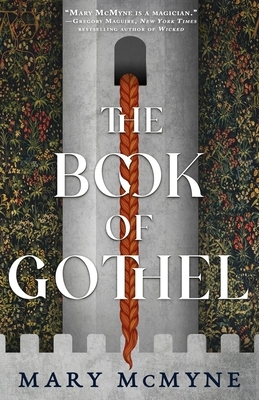 I grew up on fairy tales. As a young child, they were the pretty, dumbed down ones with the happy endings and the lack of gore. As I got older, I read the original, often brutal, versions. I guess my love of fairy tales has chased me. As an adult, I am drawn to fairy tale reimaginings or fantasy with that beautiful fairy tale cadence. So, of course The Book of Gothel called to me.
I grew up on fairy tales. As a young child, they were the pretty, dumbed down ones with the happy endings and the lack of gore. As I got older, I read the original, often brutal, versions. I guess my love of fairy tales has chased me. As an adult, I am drawn to fairy tale reimaginings or fantasy with that beautiful fairy tale cadence. So, of course The Book of Gothel called to me.
The Book of Gothel is a reimagining of the story of Rapunzel, told from the point of view of the villain. Known as Haelewise in the story, it starts with her as a young woman in a small village and continues on, the conclusion summing up the fairy tale we all know. If you’re looking for a story that doesn’t stray at all from the original fairy tale, The Book of Gothel is not for you.
Haelewise suffers from fainting spells and sensitivity to light. Of course, these things make her a pariah in her village, where such things are seen as unnatural. A daughter of a midwife, Haelewise is really only tolerated because of her mother’s skill with delivering babies. Then, her mother dies and Haelewise is left running from accusations of witchcraft.
While so much of the story happens in her village, I felt like the book didn’t really begin until Haelewise reaches the Tower of Gothel and begins to learn more about who her mother was and who she herself is. The choices she makes and her resourcefulness are what make her into an intriguing character. I wouldn’t necessarily call her likeable, but she is interesting, which is better.
There were things that I wish had been explored further, with less time being spent on others. For example, Haelewise’s almost-obsession with other women’s newborns was such an interesting aside that I wish it had been more fully explored. I would have loved to know more about her almost savage hunger for a child. I could also have done with less from her sort-of boyfriend, who I really truly hated. He was well-written; he was also a spineless jerk who wanted to have his cake and eat it too (just my personal opinion. I’m not sure that’s the effect the author was going for).
I enjoyed seeing bits and pieces from the original tail sneak through into a new narrative. The storyline was so different that these moments would serve to remind me that I was, in fact, reading a fairy tale reimagining. Otherwise, I would have forgotten completely, caught up in an engrossing and creative coming-of-age story. Because, at the end of the day, that’s what The Book of Gothel is. It is a lyrical, pretty story about a girl learning who she is and the power that she has, not as an evil witch or villain but as a woman.
While not what I expected, The Book of Gothel sucked me in and kept me quickly turning pages. It is mysterious and charming, a novel worth getting lost in.
Buy from Amazon
THE BOOK OF GOTHEL•THE BOOK OF GOTHEL•THE BOOK OF GOTHEL•THE BOOK OF GOTHEL•THE BOOK OF GOTHEL•THE BOOK OF GOTHEL•THE BOOK OF GOTHEL•THE BOOK OF GOTHEL•
The post Review – The Book of Gothel by Mary McMyne appeared first on BEFOREWEGOBLOG.
July 14, 2022
Book Review: Paladin Unbound by Jeffrey Speight

I picked up this book on the recommendations of several friends who said it would scratch my TTRPG itch, and boy, did it ever! I plowed through it in 48 hours, mostly at the beach, and it was an enjoyable ride. The main character, Umhra the Peacebreaker (what a name, btw!), is a half-orc leading a band of misfits on the hunt for a job. The job turns ugly, and leads to another quest, and another, building up to world-level stakes and a satisfyingly epic final battle involving the gods themselves.
The world is very well fleshed out for such a short book (around 300 pages), and the descriptions of the towns and cities put you right in the action. The main character has some complexity to him, and the side characters are reasonably well fleshed out, but don’t get too attached to any of them. Speight is not afraid to kill a character or two, but it’s not a TPK either (that’s Total Party Kill for the non-D&D readers out there). The action is virtually non-stop, with rising stakes in each leg of the adventure and plenty of side quests and chance encounters to liven up the narrative. There are quiet moments in between the adventures, where the characters and the readers get a break from the mayhem, and we get little insights into their relationships and backgrounds.
The book’s greatest strength may also be a weakness for some readers. The world and the story are very conventional, old-school, classic D&D style, which is very satisfying if you’re looking for that sort of thing, but at times I found it a bit too “by the book” classic fantasy. Though the fantasy races and creatures sometimes have different names and slightly different characteristics than ones you see in other books and in TTRPG, almost everything is immediately recognizable from fantasy lore. Which could make this a perfect comfort read, as it was for me, but your results may vary. The book knows exactly what it’s trying to do, and it does it exceedingly well, but I would have liked to see it stray a bit farther from the genre conventions. I did appreciate the twist on the paladin concept, which I won’t spoil here. Umhra is anything but your traditional paladin, and the mystery behind his origin and his powers was well paced and intriguing.
Paladin Unbound is highly recommended for readers eager for a rollicking swords and sorcery adventure that can be quaffed in great gulps like a mug of frothy tavern ale.
Check Out Some of Our Other PostsReview – Titan Hoppers by Rob Hayes
Buy from Amazon Add on Goodreads
PALADIN UNBOUND•PALADIN UNBOUND•PALADIN UNBOUND•PALADIN UNBOUND•PALADIN UNBOUND•PALADIN UNBOUND•PALADIN UNBOUND•PALADIN UNBOUND•
The post Book Review: Paladin Unbound by Jeffrey Speight appeared first on BEFOREWEGOBLOG.



